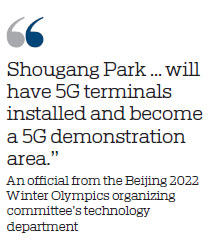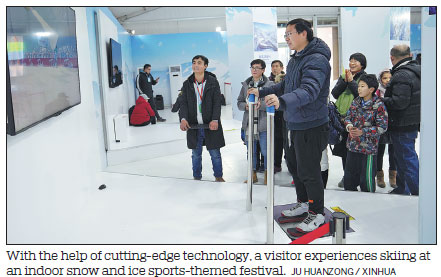Once again, China to wow world with state-of-the-art technology
A decade ago, the Beijing 2008 Olympic and Paralympic Games wowed onlookers with a torch relay in the oxygen-thin Himalayan region, the world's first high-definition broadcasts, and choreographed displays in ultramodern venues nicknamed the Bird's Nest and the Water Cube.
With less than three years to go, the Beijing 2022 Winter Olympics will surprise the world again with its wide application of intelligent technologies, from 5G to virtual reality to automatic driving.
In February, the Beijing 2022 Winter Olympics organizing committee released a plan to repurpose existing sites and to make the Winter Games a technologically advanced sporting event.

Technology has long been a pillar to a successful Olympic event. Many of the technologies deployed in the past games are a big push to the host city's growth, said local officials.
The fifth-generation cellular technology, or 5G, will be a major highlight during the upcoming Winter Olympics, which will feature superfast speeds and connection times.
It will cover all sites of the Games, said an official from the Beijing 2022 Winter Olympics organizing committee's technology department. This means a reporter watching a match on site will be able to broadcast with almost no delay and spectators will be able to livestream in real time, as the trend of livestreaming has already become a hit in today's China.
The application of 5G also unlocks the potential for experiencing live games with a 360-degree VR technology, which will enable audience using any digital devices to watch from different camera angles.
The dream that people can see and send the 8K high-definition videos via 5G wirelessly will come true, with the support of official host broadcaster Olympic Broadcasting Services.
At the first World Broadcaster Briefing for the Beijing 2022 in February, OBS' CEO Yiannis Exarchos said that the Beijing 2022 Winter Olympics are on track to be the "most tech-driven" Games and OBS plans to utilize technologies, such as 4K and 8K ultra-high-definition resolutions and VR at the Games, while "experiments with artificial intelligence" and cloud technology are also anticipated.
Exarchos believes the use of a 5G network, which OBS is developing with Chinese tech giant and Olympic Worldwide Top Partner Alibaba Group, will have a revolutionary effect on broadcasting at the Games.
"Tokyo 2020 will be the opportunity to introduce it. Beijing 2022 will probably be the time when the technology will be massively adopted and embraced by broadcasters," Exarchos added.
Now, the nation is working at full speed to get the 5G technology off the ground.
For example, the Ministry of Industry and Information Technology is speeding up the commercial use of 5G and China Unicom is launching 5G trial projects.
The upcoming Beijing Expo in Beijing's Yanqing district will use 5G, too.
"The refurbished production complex of Shougang Group, or Shougang Park, where the Beijing 2022 Winter Olympics organizing committee is located, will have 5G terminals installed and become a 5G demonstration area," the official added.
According to officials, Shougang Park is also an automatic drive service demonstration area that already saw an automatic-driving bus with ability to slow down, avoid pedestrians and brake while driving along a certain route.
Such a bus, invented by teams from Tsinghua University, Shougang Group and Baidu, is expected to serve the Beijing 2022 together with six other types of vehicles, such as unmanned sweepers and unmanned logistics vehicles.
yinruowei@chinadaily.com.cn

(China Daily 04/27/2019 page6)














